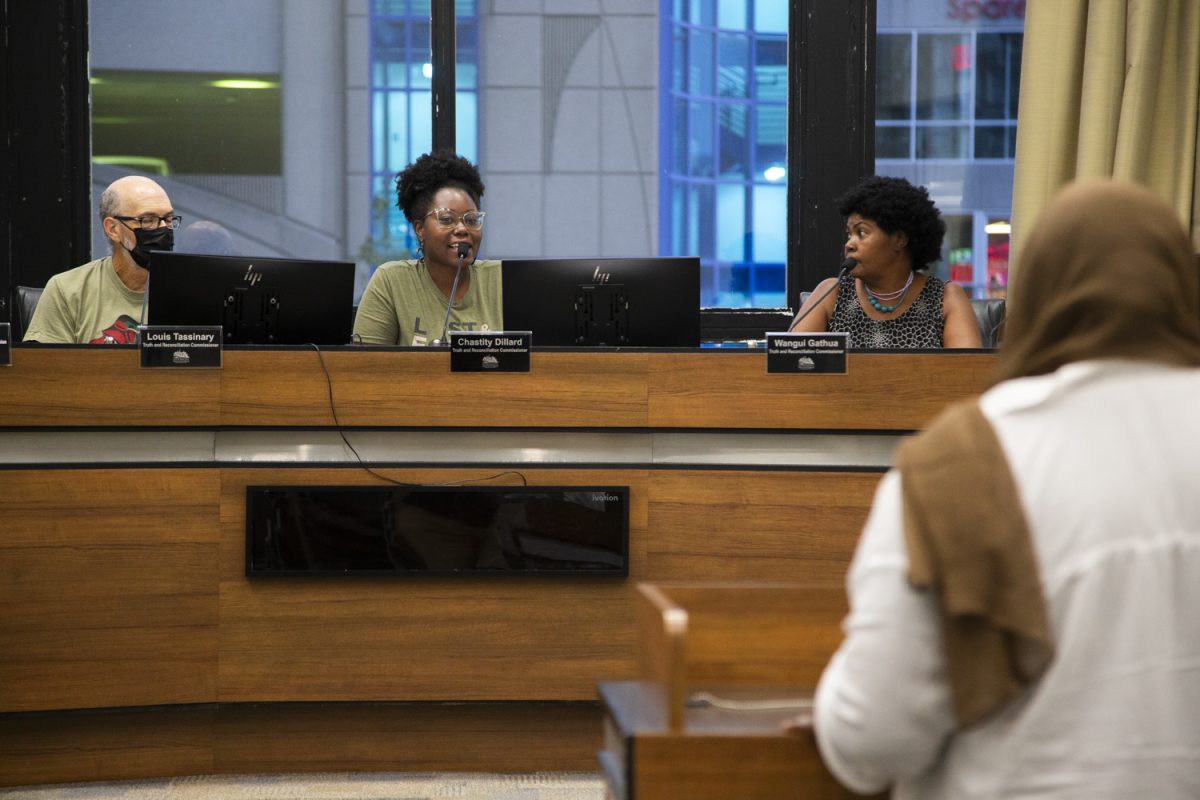Iowa City’s Ad Hoc Truth and Reconciliation Commission plans to focus on grassroots work as the commission’s four-year term is set to conclude on Dec. 31.
The commission, known as the TRC, was created by a vote of the Iowa City City Council in September 2020 with the goal of addressing systemic racism.
During a May 21 work session, TRC Chair Chastity Dillard delivered a presentation to the Iowa City City Council, highlighting the importance of the commission’s work and suggesting the possibility of continued collaboration beyond the commission’s scheduled conclusion.
“We need your help to make sure we can continue doing the work that you all decided in 2020 needed to be done,” Dillard said at the work session.
Dillard urged the council to hear the TRC’s “plea for partnership” and approve the commission’s January request for $250,000 in additional funding. While she did not request an extension of the TRC’s Dec. 31 deadline, Dillard emphasized that the commission’s work should continue.
“We truly believe in this project and this idea not as something that ends in December but as something that needs to live on for decades to come,” Dillard said.
The Iowa City City Council originally set the TRC’s end date for June 2022 when the commission was established but granted two subsequent requests for more time.
While no vote was held at the work session, Iowa City Mayor Bruce Teague and several councilors were hesitant about approving additional funding for the TRC.
“We would have to know activities that’s going to be done,” Teague said at the work session, noting that the TRC did not include any specific or general ideas for projects in its presentation.
The TRC previously received $400,000 in funding in May 2023, a portion of which was used to hire consulting firm Kearns & West to collect local data about systemic racism in policing and public safety.
The remainder was spent hosting four community truth-telling events last March.
Councilors Josh Moe and Megan Alter expressed disappointment that the data collection did not result in a more specific action plan with the funding request.
TRC Commissioner Chad Simmons stated during the work session that while it’s reasonable for the City Council to request more specific plans from the TRC, he was frustrated that the council failed to respond to the request earlier.
“You can stand in the bleachers and watch the commission die by not approving the request that we gave you,” Simmons said at the work session. “For me, it would mean that you’re giving up on the community you swore you would be here to support.”
RELATED: Ad Hoc Truth and Reconciliation Commission expresses optimism to recent public events
Dillard added that the TRC could present specific project proposals if the council first provided a general scope of the funding available.
Ultimately, Teague remained open to the possibility of increasing funding and encouraged the TRC to come back to the council with clarification on how it would be spent.
“Personally, I really do admire every one of you and recognize the sacrifices you are making. It’s not easy,” Teague said.
Still, Dillard said this presentation was a turning point for the TRC.
“After we went to city council and presented and asked to finance this a little bit more and we were told ‘not now,’ we decided to regroup and think about what we could do next that is within our mission,” Dillard said.
The TRC plans to conclude its time by hosting two meet-and-greet events scheduled for Oct. 5 and 20. The events, Dillard said, will be an opportunity for commissioners to hear directly from the community on the topic of systemic racism.
“We want to hear everything. The good, the bad, the ugly,” Dillard said. “We want people to feel heard.”
The TRC also plans to compile its final report and recommendations to present to the City Council. Commissioner Louis Tassinary is creating an outline based on the Kearns & West data, with the TRC planning to hire a contractor to draft a final report for presentation to the Iowa City City Council.
Dillard said the TRC has no plans to request additional time or funding from the City Council at this time, but the possibility remains after the council is presented with the commission’s final report.
“I would be surprised if there wasn’t something in [the final report] that said we should continue in some form or another,” Tassinary said. “This is all very important work, and I’d be surprised if the City Council didn’t agree with it in some way, shape or form.”



